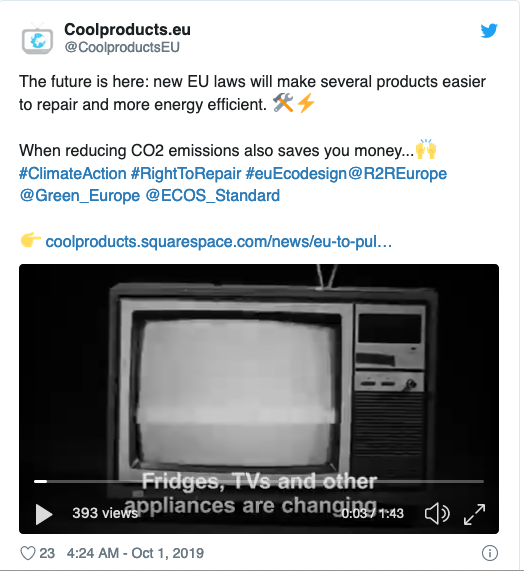The EU has recently paved the way for longer-lasting products. Now we must enshrine this ambition into our future European Green Deal.

A new EU law obliging manufacturers to make home appliances easier to repair has caught global attention. Note 1.
As of 2021, all TVs, fridges, washing machines, dishwashers and lighting products placed on the EU market will have to meet minimum design requirements aimed at extending their lifetime. For the first time, manufacturers will have to ensure that the products can be easily disassembled, and that spare parts and repair information are made available to professional repairers from seven to ten years.

A strong push for better products
This is an obvious step forward for one of the EU’s most successful environmental policies, known as the Ecodesign Directive. Over the past two decades, eco-design has halted the production of many energy-guzzling products, including incandescent or halogen lightbulbs. It was about time it also started pulling the plug on unrepairable products.
The requirements will further help Europe towards its climate targets. The European Commission estimates that from 2020 the existing eco-design measures and energy labels will save the EU as much as the annual primary energy consumption of Italy each year. They will also help households save more than €100 billion on their energy bills and generate more than €50 billion in extra revenue for companies.
This is the kind of story everyone likes. Environmental campaigners argued that better design is necessary to reduce the environmental impact of our products and carbon emissions. Consumer groups said it can help people save money by making products last longer, while the home appliance industry recognised that manufacturers too can benefit from more circular and responsible businesses.
Although much more work is needed, Brussels is sending a strong message against a throwaway culture.
Campaigners expect stronger commitments
The incoming European Commission, led by Ursula von der Leyen and Frans Timmermans, has an opportunity to build on the success of eco-design and fully align upcoming measures with the environmental and climate targets spelt out under the much-awaited European Green Deal.

Commission’s President-elect Ursula von der Leyen. Photo credits: CC-BY-4.0: © European Union 2019
During their mandate, EU officials will be expected to set more stringent resource and energy efficiency requirements.
With respect to the Paris Agreement, a medium-term objective will also be to decarbonise heating and cooling technologies before 2030. Heating and cooling represent 50% of the EU’s energy consumption, of which 75% is generated by fossil fuels. Ambitious eco-design provisions will be needed to reach this goal.
Another objective will be to ensure ICT products, including smartphones and laptops, are built to last longer. The production of ICT products has tremendous environmental and social impacts.
A recent study showed that extending the lifetime of Europe’s smartphones and laptops by just one year would save almost 4 million tonnes of CO2 emissions annually, which is equivalent to taking all Danish cars (2 million) off the roads.
Measures to extend product lifetimes should be complemented by information to consumers, which would create a greater incentive for producers to improve design. Work is ongoing to develop a scoring system to rank the repairability of products.
Including repairability and durability information on product labels, alongside efficiency classes, can help consumers identify longer-lasting electricals.
Need for a cross-sectoral approach
Policy experts have long called for a more comprehensive eco-design and energy labelling framework. As we come to terms with the irreversible consequences of the climate crisis, resource depletion as well as chemical and air pollution linked to our everyday products, there should be no limit to the political ambition we put into this work.
It is essential that the new Commission applies ecodesign-type requirements to other product groups, such as textiles, batteries, furniture and building materials. Wastefulness in these sectors, where product policies are limited or non-existent, is now impossible to ignore.
The enthusiasm over the newly agreed requirements has shown that a cross-sectoral approach to product design – one that yields multiple benefits and takes into account climate action, health and environmental protection, consumer rights and monetary savings as well as job creation – is both possible and desirable.
Reflecting on the environmental and climate challenges ahead of us, we would argue that it is also crucial.
Note 1. Mauro Anastasio, “‘Save money, cut emissions’ – EU pulls plug on wasteful, unrepairable products,” META (1 Oct 2019). bit.ly/35ClYze
Jean-Pierre Schweitzer is a policy officer at the European Environmental Bureau (EEB). Melissa Zill is programme manager at ECOS. Alongside other organisations, the EEB and ECOS lead the Coolproducts and Right to Repair campaigns, with the aim of ensuring more efficient and longer-lasting products.
This article was first published in Euractiv, and as an Editorial (7 November 2019) in META by the European Environmental Bureau at meta.eeb.org/2019/11/07/climate-action-needs-better-products/


No comments yet, add your own below